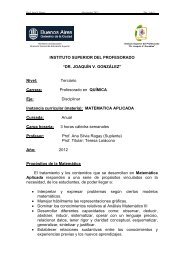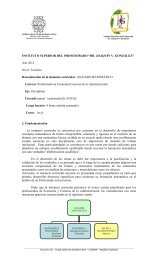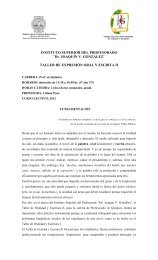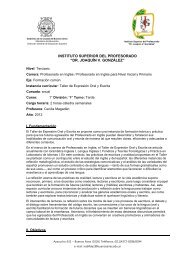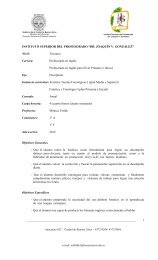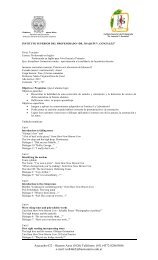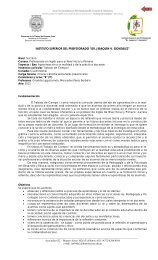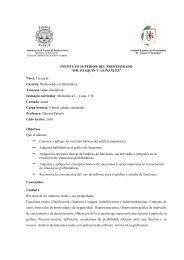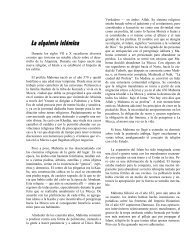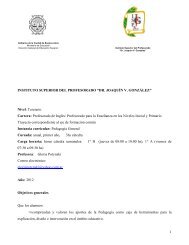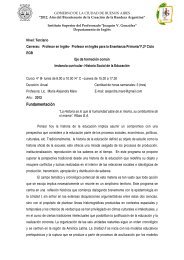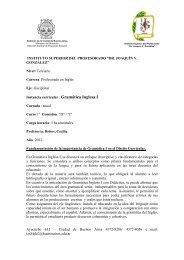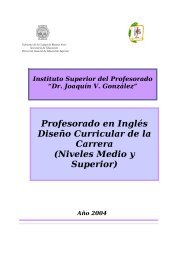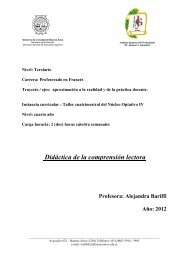Sesiones parale<strong>la</strong>s / Parall<strong>el</strong> sessionsmediante <strong>en</strong>trevistas <strong>oral</strong>es, los testimonios <strong>de</strong> sus protagonistas y crear unarchivo <strong>oral</strong> que permita reconstruir <strong>el</strong> pap<strong>el</strong> que estos profesionales jugaron<strong>en</strong> <strong>la</strong> dictadura, así como <strong>la</strong> responsabilidad <strong>en</strong> <strong>la</strong> transformación <strong>de</strong> un estam<strong>en</strong>tocrucial <strong>en</strong> <strong>la</strong> instauración <strong>de</strong> un régim<strong>en</strong> <strong>de</strong>mocrático. La recogida<strong>de</strong> testimonios <strong>de</strong> vida permitirá a<strong>de</strong>más, analizar <strong>la</strong>s trayectorias vitales <strong>de</strong>estos profesionales que <strong>de</strong>mostraron un gran coraje al arriesgar su carrera <strong>en</strong>aras <strong>de</strong> <strong>la</strong> lucha antifranquista.“Justicia Democrática” was an illegal association of judges and public prosecutorsthat arose in Spain in the sev<strong>en</strong>ties and had a special inci<strong>de</strong>nce in the legalcircles of Franco´s regime. It is one of the social movem<strong>en</strong>ts that proliferated inthe <strong>la</strong>st years of the dictatorship, and it p<strong>la</strong>yed a <strong>de</strong>cisive role, both insi<strong>de</strong> andoutsi<strong>de</strong> Spain, in the erosion and loss of prestige of the worn out dictatorship.The judicature along with the military was a fundam<strong>en</strong>tal pil<strong>la</strong>r of support to theregime. The courts of Public Or<strong>de</strong>r, created with a repressive purpose of socialconstraint, were the most effective resource to restrain the dissi<strong>de</strong>nce. It is hardlysurprising that the judicature was mostly loyal to the Caudillo. Neverth<strong>el</strong>ess, agroup of judges and public prosecutors had the courage to associate in or<strong>de</strong>r totry to resist this influ<strong>en</strong>ce. Their social prestige provi<strong>de</strong>d their dissi<strong>de</strong>nce with agreat repercussion, and their contacts with foreign colleagues h<strong>el</strong>ped them withtheir <strong>de</strong>nunciations outsi<strong>de</strong> Spain.This communication pres<strong>en</strong>ts the starting point of a very ambitious project ofthe research group of Oral History of the UCM whose aim is to recover, by meansof <strong>oral</strong> interviews, the testimonies that will allow the reconstruction of the rolethat those professionals p<strong>la</strong>yed in the restoration of <strong>de</strong>mocracy. The collection oftheir life testimonies will show their great courage wh<strong>en</strong> they risked their careerfor the sake of the fight against Franco.ALONSO, FabianaVida cotidiana y c<strong>la</strong>n<strong>de</strong>stinización. La formación <strong>de</strong>Montoneros <strong>en</strong> Santa Fe (1967-1970)Al periodizar los años transcurridos <strong>en</strong>tre 1955 y 1973 <strong>en</strong> <strong>la</strong> Arg<strong>en</strong>tina, Gordillo(2003) adopta como criterio <strong>el</strong> paso <strong>de</strong> una cultura política <strong>de</strong> resist<strong>en</strong>cia aotra <strong>de</strong> confrontación e i<strong>de</strong>ntifica, <strong>en</strong>tre 1959 y 1969, una etapa <strong>de</strong> resist<strong>en</strong>ciay protesta obreras a <strong>la</strong> par <strong>de</strong> <strong>la</strong> conformación <strong>de</strong> actores juv<strong>en</strong>iles; <strong>de</strong>s<strong>de</strong> 1969hasta fines <strong>de</strong> 1970, <strong>la</strong> formación <strong>de</strong> movimi<strong>en</strong>tos <strong>de</strong> oposición al régim<strong>en</strong> militar;y <strong>en</strong>tre 1971 y 1973, una etapa signada por <strong>el</strong> pasaje a <strong>la</strong> acción política, condistintas formas <strong>de</strong> expresión, <strong>en</strong>tre <strong>la</strong>s cuales <strong>la</strong> viol<strong>en</strong>cia cobraría un lugarc<strong>en</strong>tral. Pue<strong>de</strong> <strong>de</strong>cirse que, <strong>en</strong> <strong>la</strong> Arg<strong>en</strong>tina, <strong>la</strong> mayoría <strong>de</strong> qui<strong>en</strong>es fueron partícipesr<strong>el</strong>evantes <strong>de</strong> lo que hoy <strong>de</strong>nominamos viol<strong>en</strong>cia política vivieron suinfancia durante <strong>el</strong> primer peronismo, su adolesc<strong>en</strong>cia <strong>en</strong> los años <strong>de</strong> <strong>la</strong> crisisinstitucional iniciada <strong>en</strong> 1955, y su incorporación a <strong>la</strong> política <strong>en</strong> los años <strong>de</strong>lrégim<strong>en</strong> <strong>de</strong> <strong>la</strong> revolución arg<strong>en</strong>tina.Esta pon<strong>en</strong>cia aborda <strong>el</strong> proceso <strong>de</strong> formación <strong>de</strong> célu<strong>la</strong>s <strong>en</strong> <strong>la</strong> ciudad <strong>de</strong> SantaFe, <strong>de</strong>l que fueron protagonistas jóv<strong>en</strong>es <strong>de</strong> los ámbitos universitario y sindical,qui<strong>en</strong>es optaron por incorporarse al peronismo y a <strong>la</strong> organización políticomilitar Montoneros, que <strong>en</strong> 1970 hizo su aparición pública con <strong>el</strong> secuestro<strong>de</strong>l ex presi<strong>de</strong>nte <strong>de</strong> facto Aramburu. Para realizar este trabajo me valgo <strong>de</strong> <strong>la</strong>pr<strong>en</strong>sa local y <strong>de</strong> testimonios <strong>oral</strong>es. Dos criterios guiaron <strong>la</strong> s<strong>el</strong>ección <strong>de</strong> los<strong>en</strong>trevistados: <strong>la</strong> militancia <strong>en</strong> tres agrupaciones (At<strong>en</strong>eo Universitario, Movimi<strong>en</strong>to<strong>de</strong> Estudiantes <strong>de</strong> <strong>la</strong> Universidad Católica y Acción Sindical Arg<strong>en</strong>tina) apartir <strong>de</strong> <strong>la</strong>s cuales se inició <strong>la</strong> c<strong>la</strong>n<strong>de</strong>stinización, y <strong>la</strong> incorporación a <strong>la</strong>s célu<strong>la</strong>sa partir <strong>de</strong> re<strong>la</strong>ciones con miembros <strong>de</strong> <strong>la</strong>s agrupaciones m<strong>en</strong>cionadas.——————————————————————————————————————————————Subtema / Subteme 6Memoria, <strong>historia</strong> <strong>oral</strong> y dictaduras / Memory, OralHistory and dictatorshipsSa<strong>la</strong> Héctor P. Agosti - Mesa / Session 30Coordinan / Chair: M<strong>el</strong>isa SLATMAN y Flor<strong>en</strong>cia RODRIGUEZ——————————————————————————————————————————————MELLO LAZARINI, Fabiane LeticiaZlín up Batayporã: aspects of colonization in southeasternMato Grosso (1940-1960)The 40’s were marked by geopolitical project in Brazil known as the March tothe West. Proposed during the Vargas Era and led by the world sc<strong>en</strong>e, surroun<strong>de</strong>dthe conflicts of World War II, this project was <strong>de</strong>v<strong>el</strong>oped on the i<strong>de</strong>a ofcolonization of empty spaces, known in hinter<strong>la</strong>nds of Brazil. Covered in thishistorical mom<strong>en</strong>t, several settlem<strong>en</strong>t projects would be un<strong>de</strong>rtak<strong>en</strong> in thesoutheastern region of Mato Grosso, as w<strong>el</strong>l as in São Paulo west.Among these projects, was one that would lead to the pres<strong>en</strong>t city of SouthMato Grosso of Batayporã, <strong>de</strong>signed by Jan Antonin Bata shoe business sectorand other sectors, which suffered the effects of persecution that began wh<strong>en</strong>they gave Nazi occupation of the Su<strong>de</strong>t<strong>en</strong><strong>la</strong>nd in Czechoslovakia.Despite the complexity of the sociocultural p<strong>la</strong>ce / space, object of this research,resulting from the ethnic mix of compon<strong>en</strong>ts, the pres<strong>en</strong>ce of migrants,and their specific character and economic history, contributed to the productionof <strong>oral</strong> sources, through the use of life trajectories, as method, oft<strong>en</strong> becauseof <strong>la</strong>ck of docum<strong>en</strong>tation, oft<strong>en</strong> in poor condition, in Czech <strong>la</strong>nguage ordispersed.The <strong>de</strong>v<strong>el</strong>opm<strong>en</strong>t of this proposal is the main objective of un<strong>de</strong>rstandingthe process of immigration and colonization of the region b<strong>el</strong>onging to thesouthern state of Mato Grosso, Mato Grosso do Sul today, which resulted inthe formation of a core of colonization, th<strong>en</strong> immediat<strong>el</strong>y transformed into thecity of Batayporã. The fi<strong>el</strong>d work, through the use of resources and proceduresof <strong>oral</strong> history, along with the compi<strong>la</strong>tion and analysis of docum<strong>en</strong>ts that arescattered with families and the first inhabitants of the municipality, who stillresi<strong>de</strong> there, allowed the first reflections of this work.CARDINA, Migu<strong>el</strong>Torture, imprisonm<strong>en</strong>t, sil<strong>en</strong>ces. Radical oppositionand political repression during the Portuguese dictatorshipThis paper aims at examining the t<strong>en</strong>sion betwe<strong>en</strong> the repressive dynamicsin p<strong>la</strong>ce during the Estado Novo (New State) Portuguese dictatorship (1933-1974), and the types of behavior — either expected or actual — un<strong>de</strong>r tortureand questioning, as w<strong>el</strong>l as in subsequ<strong>en</strong>t prison <strong>en</strong>vironm<strong>en</strong>t. The first questionto be raised is how the Portuguese left with Maoist roots <strong>de</strong>alt, betwe<strong>en</strong>1964 and 1974, with the so called “issue of conduct”, meaning “talking” or “nottalking” while in prison and subjected to torture. On the other hand, it is int<strong>en</strong><strong>de</strong>dto <strong>de</strong>monstrate how this issue persisted throughout time and what kind ofre<strong>la</strong>tionship can be established betwe<strong>en</strong> torture, sil<strong>en</strong>ce and memory. Finally,it will be shown how the conflict opposing Maoists and Communists insi<strong>de</strong> theprison fits into in the dynamics of i<strong>de</strong>ological disagreem<strong>en</strong>t that set both curr<strong>en</strong>tsagainst each other in those years.NICHOLLS LOPEANDÍA, NancyThe FASIC Testimonial Archive of the Repression,1975-1990: ¿Is it possible to narrate the testimony oftorture?Si bi<strong>en</strong> existe un acopio importante <strong>de</strong> testimonios <strong>de</strong> personas que sufrieron<strong>la</strong> represión <strong>en</strong> sus distintas formas bajo dictadura militar <strong>en</strong> Chile, expresado<strong>en</strong> variados soportes y registros, esta pon<strong>en</strong>cia indaga <strong>en</strong> <strong>la</strong> imposibilidad<strong>de</strong>l testimonio <strong>en</strong>tre <strong>la</strong>s víctimas <strong>de</strong> vio<strong>la</strong>ción a los <strong>de</strong>rechos humanos. Para<strong>el</strong>lo, se analizarán fragm<strong>en</strong>tos testimoniales tanto <strong>de</strong>l Archivo Testimonial <strong>de</strong><strong>la</strong> Represión FASIC (1973-1990), como <strong>de</strong> otras recopi<strong>la</strong>ciones <strong>oral</strong>es, que <strong>de</strong>manera escueta, casi tang<strong>en</strong>cial, se refier<strong>en</strong> a dicha imposibilidad. La no <strong>en</strong>unciación<strong>de</strong>l testimonio se <strong>en</strong>t<strong>en</strong><strong>de</strong>rá como una fractura no <strong>en</strong>m<strong>en</strong>dada <strong>de</strong>l proyecto<strong>de</strong> vida <strong>de</strong>l sujeto víctima <strong>de</strong> represión, que evi<strong>de</strong>ntem<strong>en</strong>te respon<strong>de</strong>a <strong>la</strong> no e<strong>la</strong>boración <strong>de</strong>l trauma. Sin embargo, consi<strong>de</strong>rando este <strong>el</strong>em<strong>en</strong>tofundam<strong>en</strong>tal <strong>en</strong> <strong>el</strong> p<strong>la</strong>no psicológico, se buscará situar y problematizar <strong>la</strong> no<strong>en</strong>unciación <strong>en</strong> <strong>el</strong> contexto histórico <strong>de</strong> <strong>la</strong> post-dictadura que no <strong>la</strong> favorece eincluso <strong>la</strong> impi<strong>de</strong>. De este modo, se indagará <strong>en</strong> <strong>la</strong>s hu<strong>el</strong><strong>la</strong>s aún palpables <strong>de</strong>lterrorismo <strong>de</strong> estado, <strong>en</strong> un p<strong>la</strong>no psico-social pero también histórico, uno <strong>de</strong>cuyos indicios está constituido por una memoria subterránea, leída a contrap<strong>el</strong>o,o abiertam<strong>en</strong>te cont<strong>en</strong>ida, sin cauce narrativo.La imposibilidad <strong>de</strong>l testimonio, <strong>en</strong>tonces, buscará arrojar luz a <strong>la</strong> complejaconfiguración <strong>de</strong> <strong>la</strong> post-dictadura que ha heredado nudos no resu<strong>el</strong>tos <strong>en</strong> <strong>el</strong>p<strong>la</strong>no <strong>de</strong> <strong>la</strong> memoria individual y colectiva.URBÁŠEK, Pav<strong>el</strong>Military service in Czechoslovakia (1969–1989).Czech Society during the So-Called Normalization and Transformation viaThis research is a part of a broa<strong>de</strong>r research project with the title Czech societyin the era of the so called normalization and transformation: biographicaccounts. The main hol<strong>de</strong>r of the project is the C<strong>en</strong>tre for Oral History of theInstitute of Contemporary History of the Aca<strong>de</strong>my of Sci<strong>en</strong>ce in Prague.The aim of our research task Compulsory military service in the former Czechoslovakia(1969–1989) is a complex analysis of this fi<strong>el</strong>d in the <strong>la</strong>st tw<strong>en</strong>ty years ofthe socialist regime exist<strong>en</strong>ce in Czechoslovakia, i.e. betwe<strong>en</strong> 1968 and 1989.We p<strong>la</strong>n to utilize writt<strong>en</strong> resources (archive docum<strong>en</strong>ts, army prescriptions,newspapers, magazines), as w<strong>el</strong>l as interviews with m<strong>en</strong> who att<strong>en</strong><strong>de</strong>d armyservice within the chos<strong>en</strong> time frame.58
Sesiones parale<strong>la</strong>s / Parall<strong>el</strong> sessionsThe compulsory military service existed in Czechoslovakia since the establishingof the in<strong>de</strong>p<strong>en</strong><strong>de</strong>nt state in 1918, from the beginning of the thirties thearmy duty had tak<strong>en</strong> two years.In 1949 – after the communist takeover of the power – a new Army Service Actwas passed, that re-confirmed the l<strong>en</strong>gth/duration of the service to be 2 yearsin the socialist Czechoslovakia.Since 1955 Czechoslovakia and other countries of the so called communistblock joined the military pact of the Warsaw Treaty that <strong>la</strong>sted till 1991. Czechoslovakiap<strong>la</strong>yed a very important geopolitical, military and economic rolein this pact.Compulsory military service used to be a fundam<strong>en</strong>tal intrusion in the life of ayoung man from the very beginning of his career. There were many functionsthat the compulsory service fulfilled in the socialist Czechoslovakia. Apartfrom the actual military training it inclu<strong>de</strong>d also the indoctrination in the s<strong>en</strong>seof Marxist-L<strong>en</strong>inist i<strong>de</strong>ology, and for some social groups of males it p<strong>la</strong>yedalso an important social function. The military service was oft<strong>en</strong> affected bymany socio-pathological features.BORTLOVÁ, HanaOral History: Biographic Narratives of Czech(oslovak)Firefighters – A Case Study ReportThrough historical analysis and interpretation of memories of members ofspecific popu<strong>la</strong>tion groups, the project aims to analyze the ways in whichthe Czech and Czechoslovak society has be<strong>en</strong> behaving during the <strong>la</strong>st 40–50years. The groups, heretofore rather marginalized in historical research, comprisefour vocational categories: 1) people employed in the tertiary sector ofthe economy/the service industry, 2) people employed in agriculture, 3) repres<strong>en</strong>tativesof high economic managem<strong>en</strong>t and 4) members of the armed forces(professional soldiers, security officers and policem<strong>en</strong>, firem<strong>en</strong>).The project is a continuation of previous research projects conducted at theOral History C<strong>en</strong>ter at the Institute for Contemporary History in Prague (nam<strong>el</strong>ypre-1989 political <strong>el</strong>ites and opposition members, working c<strong>la</strong>ss membersand int<strong>el</strong>lig<strong>en</strong>tsia) and focuses on the changes of opinions, attitu<strong>de</strong>s andbehavior of these social and vocational groups before and after 1989. Theresearch should significantly contribute to our knowledge of the nature andspecifics of the m<strong>en</strong>tioned “normalization” regime in Czechoslovakia as w<strong>el</strong><strong>la</strong>s the transformation-to-<strong>de</strong>mocracy era.In my paper I will outline the curr<strong>en</strong>t state of research (we expect to have conductedmore than a 100 interviews by September 2012), comm<strong>en</strong>t on somes<strong>el</strong>ected methodological problems associated with <strong>oral</strong>-historical research ofthese groups and offer my interpretations of s<strong>el</strong>ected topics.——————————————————————————————————————————————Subtema / Subteme 7Historia <strong>oral</strong> y mundo <strong>de</strong>l trabajo / Oral History andthe world of workSa<strong>la</strong> Meyer Dubrovsky - Mesa / Session 35Coordinan / Chair: Laura Pasquali - Gonzalo Pérez Álvarez——————————————————————————————————————————————TELLO, Ana María SagrarioNarrativas <strong>de</strong> Procesos <strong>de</strong> Trabajo <strong>de</strong> Doc<strong>en</strong>tes UniversitariosEl pres<strong>en</strong>te trabajo int<strong>en</strong>ta poner <strong>en</strong> discusión los p<strong>la</strong>nteos pr<strong>el</strong>iminares <strong>de</strong> una futuraindagación acerca <strong>de</strong> <strong>la</strong>s posibilida<strong>de</strong>s y caminos a transitar durante un procesoque se propone realizar transformaciones <strong>en</strong> <strong>el</strong> ámbito <strong>de</strong> una UniversidadNacional <strong>de</strong> Arg<strong>en</strong>tina (U.N. Río Cuarto) a partir <strong>de</strong> <strong>la</strong> asunción <strong>en</strong> <strong>el</strong> mes <strong>de</strong> mayo<strong>de</strong> 2011, <strong>de</strong> un nuevo grupo <strong>de</strong> conducción <strong>de</strong>l gobierno <strong>de</strong> dicha institución.La investigación abrevaría <strong>en</strong> un corpus <strong>de</strong> conocimi<strong>en</strong>tos g<strong>en</strong>erado <strong>en</strong> estudiosanteriores a través <strong>de</strong> <strong>la</strong> pert<strong>en</strong><strong>en</strong>cia a un equipo <strong>de</strong> investigación cuyoobjeto se c<strong>en</strong>tra <strong>en</strong> <strong>la</strong>s políticas educativas neoliberales emanadas <strong>de</strong>s<strong>de</strong> <strong>el</strong>Estado Nacional Arg<strong>en</strong>tino <strong>de</strong>s<strong>de</strong> fines <strong>de</strong> los ’80. En particu<strong>la</strong>r, <strong>el</strong> foco <strong>de</strong> losanálisis tomó <strong>el</strong> hecho <strong>de</strong> que <strong>el</strong> mo<strong>de</strong>lo <strong>de</strong> Universidad que empieza a implem<strong>en</strong>tarse<strong>en</strong> forma ac<strong>el</strong>erada <strong>en</strong> <strong>la</strong> década <strong>de</strong> los ‘90 se tornaba cada vez más“competitivo y difer<strong>en</strong>ciador”, fundado <strong>en</strong> <strong>el</strong> p<strong>en</strong>sami<strong>en</strong>to neoliberal. La toma<strong>de</strong> <strong>de</strong>cisiones y los mecanismos <strong>de</strong> regu<strong>la</strong>ción <strong>en</strong> <strong>la</strong> Universidad han formadoparte <strong>de</strong> una gama <strong>de</strong> políticas g<strong>en</strong>eradas <strong>en</strong> distintos ámbitos – <strong>de</strong>s<strong>de</strong> losc<strong>en</strong>tros mundiales <strong>de</strong> po<strong>de</strong>r económico, como <strong>el</strong> Banco Mundial o <strong>el</strong> FMI, hastanuestras faculta<strong>de</strong>s y <strong>de</strong>partam<strong>en</strong>tos- y se han constituido, <strong>en</strong> tanto políticas<strong>de</strong> evaluación, <strong>en</strong> instrum<strong>en</strong>tos i<strong>de</strong>ológicos y doctrinarios (Krotsch, 1998) quecondicionaron nuestras prácticas.Las preguntas iniciales que ori<strong>en</strong>tan este estudio alu<strong>de</strong>n a ¿qué implica int<strong>en</strong>targ<strong>en</strong>erar alternativas sea <strong>en</strong> <strong>el</strong> niv<strong>el</strong> normativo como <strong>en</strong> <strong>la</strong>s prácticas concretas?¿qué acciones instituirían prácticas <strong>de</strong> resist<strong>en</strong>cia al po<strong>de</strong>r hegemóniconeoliberal? ¿cómo caracterizaríamos los sujetos doc<strong>en</strong>tes que se constituy<strong>en</strong><strong>en</strong> <strong>el</strong> marco <strong>de</strong> nuevas regu<strong>la</strong>ciones <strong>de</strong> producción? ¿Cómo conducir un proceso<strong>de</strong> cambio que instale <strong>en</strong> <strong>la</strong> comunidad <strong>la</strong> reflexión sobre <strong>la</strong> educación<strong>en</strong> torno a valores tales como “popu<strong>la</strong>r”, “<strong>de</strong>mocrática”, “emancipadora”,“Latinoamericana”? ¿En qué consistiría cambiar <strong>la</strong> universidad rumbo a talesvalores? ¿Qué procesos están si<strong>en</strong>do insta<strong>la</strong>dos <strong>en</strong> <strong>el</strong> cotidiano <strong>de</strong>l trabajo <strong>de</strong>los doc<strong>en</strong>tes que evi<strong>de</strong>nci<strong>en</strong> esas transformaciones?Mont<strong>en</strong>egro, Antonio TorresLaberintos <strong>de</strong> <strong>la</strong> memoria <strong>de</strong> luchas <strong>en</strong> <strong>la</strong> Justicia <strong>de</strong>lTrabajo <strong>en</strong> BrasilEn 1998 <strong>en</strong>trevisté a un trabajador rural jubi<strong>la</strong>do (Luiz Inocêncio Barreto) que,durante muchos años, había p<strong>la</strong>ntado y cortado caña <strong>en</strong> <strong>la</strong>s tierras <strong>de</strong> una usina<strong>de</strong> azúcar, <strong>en</strong> <strong>la</strong> ciudad <strong>de</strong> Escada, <strong>en</strong> <strong>la</strong> provincia <strong>de</strong> Pernambuco/Brasil. Elinterés por <strong>en</strong>trevistarlo resultó <strong>de</strong>l hecho <strong>de</strong> que <strong>en</strong> los 70, cuando Brasil se<strong>en</strong>contraba <strong>en</strong> pl<strong>en</strong>o dominio <strong>de</strong>l régim<strong>en</strong> militar (1964 a 1985), un grupo <strong>de</strong>70 trabajadores y él <strong>de</strong>mandaron a su patrono <strong>en</strong> <strong>la</strong> Justicia <strong>de</strong>l Trabajo. En <strong>la</strong>acción <strong>la</strong>b<strong>oral</strong> contra <strong>el</strong> patrono exigían que les fueran pagadas <strong>la</strong>s vacacionesatrasadas, <strong>el</strong> 13 er sa<strong>la</strong>rio y <strong>el</strong> <strong>de</strong>scanso remunerado. Después <strong>de</strong> <strong>la</strong> Justicia <strong>de</strong>lTrabajo, haber <strong>de</strong>cidido a favor <strong>de</strong> los trabajadores y publicado <strong>la</strong> s<strong>en</strong>t<strong>en</strong>ciaobligando al patrono a pagar todo lo que les era <strong>de</strong>bido, <strong>el</strong>los pasaron a seram<strong>en</strong>azados <strong>de</strong> muerte por <strong>el</strong> patrono y por <strong>el</strong> vigi<strong>la</strong>nte <strong>de</strong> aqu<strong>el</strong><strong>la</strong> propiedadagríco<strong>la</strong>. Como era un período <strong>en</strong> que luchar por <strong>de</strong>rechos <strong>la</strong>b<strong>oral</strong>es era fácilm<strong>en</strong>teasociado al comunismo, dichos trabajadores, <strong>de</strong>spués <strong>de</strong> <strong>la</strong> victoria <strong>en</strong><strong>la</strong> Justicia <strong>de</strong>l Trabajo, pasaron a ser perseguidos – como comunistas - por <strong>la</strong>sautorida<strong>de</strong>s policiales y militares. Y <strong>el</strong> día 05 <strong>de</strong> octubre <strong>de</strong> 1972, Luis Inocêncioy sus dos hermanos, João Inocêncio Barreto y José Inocêncio Barreto, fueron<strong>el</strong> b<strong>la</strong>nco <strong>de</strong> un ataque comandado por <strong>el</strong> vigi<strong>la</strong>nte y un grupo <strong>de</strong> policías. Enaqu<strong>el</strong> ataque, José Inocêncio Barreto fue asesinado, João Inocêncio Bar<strong>retos</strong>ufrió ocho disparos y fue hospitalizado y Luiz Inocêncio Barreto, baleado <strong>en</strong> <strong>la</strong>mano, escapó echándose a correr a través <strong>de</strong> los cañaverales. Este texto analizay narra esa <strong>historia</strong>.VIVALLOS ESPINOZA, CarlosExperi<strong>en</strong>cias <strong>la</strong>b<strong>oral</strong>es y procesos <strong>de</strong> retiro <strong>en</strong> <strong>la</strong> minería<strong>de</strong>l carbón <strong>de</strong> Lota y Coron<strong>el</strong>. Chile a mediados<strong>de</strong>l <strong>siglo</strong> XXEn estas líneas int<strong>en</strong>to <strong>en</strong>tregar una visión lo más fi<strong>el</strong> posible <strong>de</strong> <strong>la</strong> vida <strong>de</strong> ungrupo <strong>de</strong> mineros <strong>de</strong>l carbón <strong>de</strong> <strong>la</strong> ciudad <strong>de</strong> Lota, que actualm<strong>en</strong>te se <strong>en</strong>cu<strong>en</strong>tranretirados <strong>de</strong> esa actividad. Con <strong>el</strong>lo contribuir a <strong>la</strong> compr<strong>en</strong>sión <strong>de</strong>l procesoindustrializador <strong>en</strong> <strong>el</strong> Chile contemporáneo c<strong>en</strong>trándonos <strong>en</strong> un grupo <strong>de</strong>obreros con características sociales particu<strong>la</strong>res, tales como <strong>la</strong> pauperizacióneconómica y <strong>la</strong> exclusión social. Uno <strong>de</strong> los puntos c<strong>en</strong>trales <strong>de</strong> nuestro análisis,que se realiza <strong>de</strong>s<strong>de</strong> <strong>la</strong> <strong>historia</strong> social, es <strong>en</strong>t<strong>en</strong><strong>de</strong>r <strong>la</strong> formación <strong>de</strong> <strong>la</strong> i<strong>de</strong>ntidadobrera como una construcción sociocultural, que como tal se constituyey reconstruye a través <strong>de</strong>l tiempo.Des<strong>de</strong> <strong>el</strong> retorno <strong>de</strong> <strong>la</strong> <strong>de</strong>mocracia, los gobiernos <strong>de</strong> <strong>la</strong> Concertación hanpercibido como un éxito <strong>el</strong> haber reducido significativam<strong>en</strong>te <strong>la</strong> pobreza <strong>en</strong>Chile. Si <strong>en</strong> 1990, uno <strong>de</strong> los peores legados <strong>de</strong> <strong>la</strong> dictadura era un númerocercano a los 5 millones <strong>de</strong> pobres, ya <strong>en</strong> 1996 se había reducido a 3.3 millones,aunque <strong>la</strong> distribución <strong>de</strong>l ingreso seguía si<strong>en</strong>do una <strong>de</strong> <strong>la</strong>s más <strong>de</strong>siguales<strong>de</strong>l mundo (M<strong>el</strong>ler, 1999). D<strong>en</strong>tro <strong>de</strong>l mo<strong>de</strong>lo neoliberal, los pobreshan pasado a ser una cifra, un dato. El nuevo mo<strong>de</strong>lo trajo a<strong>de</strong>más una nuevaconcepción acerca <strong>de</strong>l trabajo y <strong>la</strong>s re<strong>la</strong>ciones <strong>la</strong>b<strong>oral</strong>es, que se concretó <strong>en</strong><strong>la</strong> legis<strong>la</strong>ción a través <strong>de</strong>l P<strong>la</strong>n Lab<strong>oral</strong> <strong>de</strong> fines <strong>de</strong> <strong>la</strong> década <strong>de</strong> los set<strong>en</strong>ta, <strong>en</strong>pl<strong>en</strong>a dictadura. Esta nueva concepción supuso para <strong>la</strong> mayoría <strong>de</strong> los trabajadores<strong>la</strong> pérdida <strong>de</strong> <strong>la</strong>s protecciones que habían logrado a lo <strong>la</strong>rgo <strong>de</strong>l <strong>siglo</strong>XX, <strong>la</strong> atomización <strong>de</strong> sus organizaciones colectivas, y <strong>en</strong> una precariedadocupacional <strong>de</strong>bido a <strong>la</strong> recurr<strong>en</strong>cia cíclica <strong>de</strong> <strong>la</strong>s crisis económicas capitalistasy <strong>la</strong> obsolesc<strong>en</strong>cia <strong>de</strong> sus activida<strong>de</strong>s. El cierre <strong>de</strong>finitivo <strong>de</strong> <strong>la</strong>s minas<strong>de</strong> carbón es un ejemplo c<strong>la</strong>ro <strong>de</strong> <strong>el</strong>lo (Sa<strong>la</strong>zar y Pinto, 2002). Hoy <strong>la</strong>s ciuda<strong>de</strong>scarboníferas pres<strong>en</strong>tan un panorama <strong>de</strong>so<strong>la</strong>dor, normalm<strong>en</strong>te li<strong>de</strong>ran <strong>la</strong>sestadísticas <strong>de</strong> <strong>de</strong>sempleo y <strong>la</strong>s posibilida<strong>de</strong>s <strong>de</strong> revertir esa situación soncasi nu<strong>la</strong>s. Resulta paradójico p<strong>en</strong>sar que <strong>el</strong> mismo liberalismo que formóa mediados <strong>de</strong>l <strong>siglo</strong> XIX una <strong>de</strong> <strong>la</strong>s industrias más floreci<strong>en</strong>tes <strong>de</strong> nuestropaís, fue <strong>el</strong> <strong>en</strong>cargado casi 150 años <strong>de</strong>spués <strong>de</strong> <strong>de</strong>struir<strong>la</strong>, con<strong>de</strong>nando a supob<strong>la</strong>ción a estos niv<strong>el</strong>es <strong>de</strong> pobreza.59



